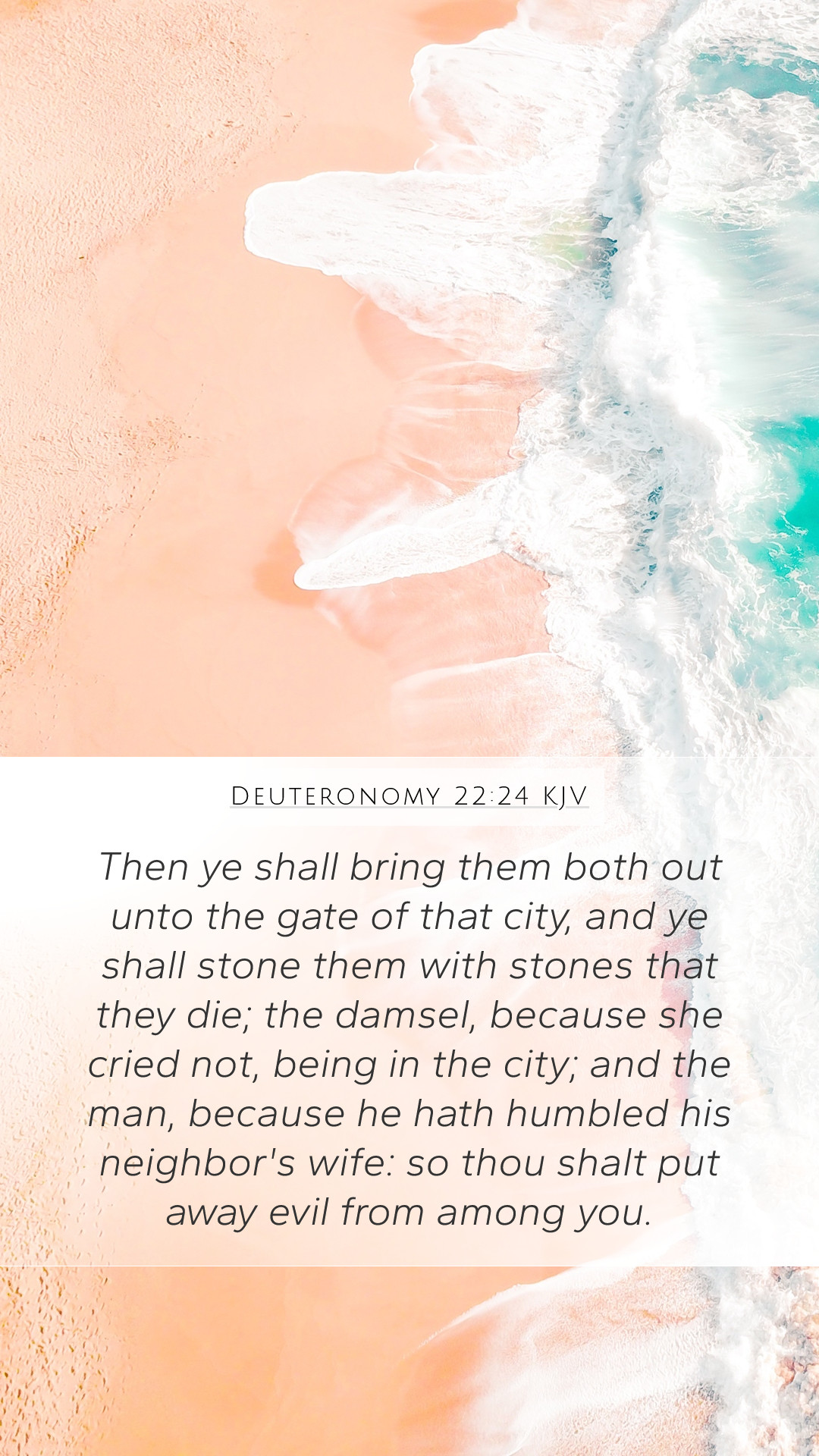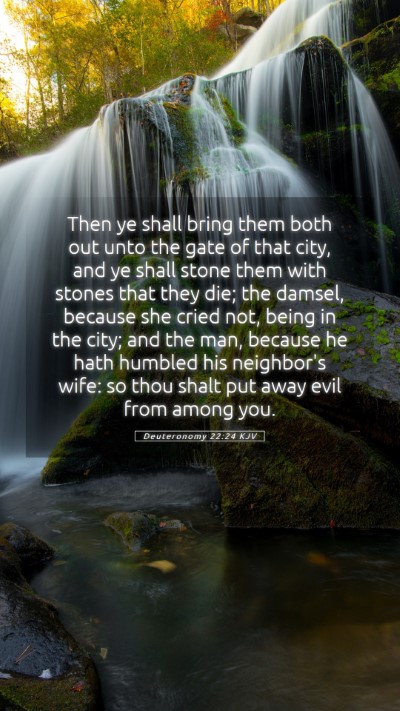Understanding Deuteronomy 22:24
Bible Verse: Deuteronomy 22:24 states, "Then you shall bring them both out to the gate of that city, and you shall stone them to death with stones; the young woman because she did not cry out in the city, and the man because he has humbled his neighbor's wife. So you shall put away the evil from among you."
This verse addresses a legal provision concerning adultery and reflects the seriousness with which the ancient Hebrew society viewed breaches of marital fidelity. It combines key themes of justice, community responsibility, and the sanctity of marriage within the broader framework of Israelite law.
Bible Verse Meanings
This verse illustrates the severe consequences prescribed for certain immoral acts to maintain social order and uphold moral standards.
- Severe Consequences for Adultery: The ultimate punishment of stoning indicates the gravity with which such transgressions were treated in ancient Israelite culture, emphasizing communal ethics.
- Role of the Community: By bringing the offenders to the city gate, the passage signifies community involvement in upholding moral law and ensuring accountability.
- Focus on Innocence and Consent: The distinction made between the man and woman highlights the societal expectations around their behaviors and the consequences derived from perceived innocence or complicity.
Bible Verse Interpretations
Interpretations of this verse vary among scholars, but certain themes consistently emerge.
- Matthew Henry Commentary: Henry emphasizes the moral implications and calls for vigilance against immorality, which strengthens societal integrity.
- Albert Barnes Commentary: Barnes notes the implications of the law as preventative rather than simply punitive, aiming to deter individuals from sinning.
- Adam Clarke Commentary: Clarke analyzes the cultural context, suggesting these laws served as a boundary for ancient Israelite societal norms regarding purity and sin.
Bible Verse Understanding
Understanding this verse requires awareness of the cultural and historical context of the time.
- Historical Context: The laws given to Israel were designed to establish a distinct identity and promote holiness among the people.
- Religious Significance: The legal stipulations found in Deuteronomy emphasize an agreement between God and His people regarding moral conduct and justice.
- View of Marital Fidelity: Marital fidelity was seen as crucial for maintaining family structures and, consequently, the society as a whole.
Bible Verse Explanations
Deuteronomy 22:24 serves as a stark reminder of the cultural values emphasized in the past.
- Moral Instruction: The passage instructs the community to act against evil, fostering a sense of collective responsibility.
- Consequences of Sin: The emphasis on punishment reflects the belief in a just God who demands holiness from His people.
- Community Justice: It highlights the role of the community in administering justice rather than leaving it to individual retribution.
Scripture Analysis
A deeper scriptural analysis reveals layers of understanding of God's law.
- Justice vs. Mercy: The tension between strict justice and the call for mercy is an underlying theme in many of the laws found in the Old Testament.
- Ethical Standards: This verse sets a high moral standard, reflecting God's character of holiness and righteousness.
- Foundation of Legal Codes: The laws in Deuteronomy form the basis of legal and ethical practices that continue to influence Jewish and Christian thought today.
In-Depth Bible Verse Analysis
Through careful study and interpretation, this verse invites readers to contemplate the implications of moral failure within society.
- Contemporary Application: While the penal codes may not apply today, the underlying principles of justice, community responsibility, and moral integrity remain relevant.
- Reflection on Modern Context: How do modern societies address issues of infidelity and moral breaches?
- Parallel with New Testament Teachings: Consider the teachings of Jesus regarding mercy and forgiveness, which provide a counter-narrative to Old Testament legalism.
Cross References
Related scriptures that add depth to the understanding of Deuteronomy 22:24 include:
- Leviticus 20:10: Discusses the consequences of adultery.
- John 8:3-11: Jesus' encounter with an adulterous woman illustrates grace amid the law.
- Proverbs 6:32-33: Highlights the folly and consequences of infidelity.
Conclusion
In summary, Deuteronomy 22:24 reflects God's standards for holiness and community well-being. The verse serves as both a historical reminder and a modern challenge to uphold moral values within society. Studying such verses can deepen one's understanding of Scripture and its application in daily life, making it a vital aspect of Bible study groups and individual exploration.


